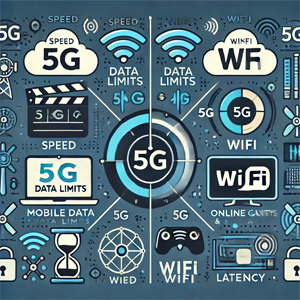 In an era where streaming and gaming are at our fingertips, choosing between mobile data and WiFi is crucial to ensure the best experience. Each connection has its pros and cons for speed, reliability, and data usage, impacting the overall quality of your streaming and gaming experience. This article dives into the differences, benefits, and case studies to help you determine which is better for your needs.
In an era where streaming and gaming are at our fingertips, choosing between mobile data and WiFi is crucial to ensure the best experience. Each connection has its pros and cons for speed, reliability, and data usage, impacting the overall quality of your streaming and gaming experience. This article dives into the differences, benefits, and case studies to help you determine which is better for your needs.
Key Differences Between Mobile Data and WiFi for Streaming and Gaming
WiFi connections typically offer faster download and upload speeds compared to mobile data, depending on your internet plan and signal quality. High-speed WiFi is ideal for streaming HD content and online gaming, as it provides consistent speeds without data caps. On the other hand, 5G mobile data is now reaching WiFi-level speeds, but its performance may vary depending on your location, network congestion, and coverage. Latency, or the delay between input and response, is a critical factor in gaming and real-time streaming. WiFi generally has lower latency, which is vital for multiplayer games and smooth streaming. However, with 5G, mobile data can achieve similar low latency, especially in urban areas with strong coverage. Most mobile data plans have caps or throttling policies that can limit your data after reaching a certain threshold. Streaming in HD or gaming over mobile data can quickly consume this limit. WiFi connections at home usually have higher data limits or even unlimited plans, making them better suited for data-heavy activities like 4K streaming or extended gaming sessions.
Pros and Cons of WiFi for Streaming and Gaming
WiFi, especially with fiber connections, can reach high speeds, ensuring smooth streaming and gaming. A stable WiFi connection generally provides lower latency, reducing lag in online gaming. Many WiFi plans come with high or unlimited data limits, allowing extended play and HD streaming without worrying about data caps. However, WiFi is bound to a particular location, restricting you from taking the connection on the go. Walls, other devices, and network congestion can impact signal quality, affecting your experience. Case Study - Emily’s High-Quality Streaming with WiFi: Emily, a movie enthusiast, streams 4K content daily on her smart TV. She initially tried using mobile data, but buffering issues and data overages made it challenging to enjoy high-quality streaming. With her home’s WiFi plan, Emily now experiences seamless playback without interruptions, making WiFi a superior choice for her needs.
Pros and Cons of Mobile Data for Streaming and Gaming
Mobile data enables streaming and gaming on the go, making it ideal for those who frequently travel. In case of WiFi outages, mobile data serves as a reliable alternative. With 5G, mobile data speeds can approach WiFi levels, providing a strong option for high-quality streaming and online gaming where coverage is strong. However, many mobile plans have data limits, leading to throttling once the limit is reached, which can disrupt streaming and gaming. Mobile data tends to drain battery life faster than WiFi, especially with intensive apps. Case Study - Mark’s Mobile Data for Gaming on the Go: Mark, a gamer who travels for work, relies on mobile data to play games while commuting. While 4G gave him a decent experience, he upgraded to a 5G plan and found his latency and speeds greatly improved. Now he can play multiplayer games without major lag, though he’s mindful of his data usage to avoid hitting his cap.
Which Connection Is Better for Streaming?
For high-quality streaming, especially in HD or 4K, WiFi is usually the better choice due to its higher speeds, lower latency, and data limits. However, 5G data is closing the gap, especially in urban areas with reliable coverage. Case Study - Sarah’s 5G Streaming Experience: Sarah enjoys streaming on her phone while traveling. When she upgraded to a 5G plan, she found she could stream HD shows without buffering, even on public transit. She still prefers WiFi at home for data-intensive streaming, but for mobile viewing, 5G is a viable alternative.
Which Connection Is Better for Gaming?
For competitive gaming that requires low latency, WiFi is generally the better option. However, 5G can be a strong competitor, especially in well-covered areas where it provides consistent speeds and low latency. Case Study - Alex’s Switch to WiFi for Stable Gaming: Alex, a competitive gamer, initially used mobile data for online gaming but frequently encountered connection drops and lag. After switching to WiFi, his experience improved dramatically, with minimal lag and lower latency. This upgrade has been crucial in helping him maintain his performance and rank in competitive matches.
Choosing the Right Connection for Your Needs
The choice between mobile data and WiFi ultimately depends on your usage habits and specific needs. If you’re on the go and require constant connectivity, 5G mobile data offers reliable performance for streaming and casual gaming. For consistent high-quality streaming and gaming, WiFi is generally more reliable, offering better speed, latency, and data limits. Keep mobile data as a backup for situations when WiFi is unavailable, or use it sparingly to avoid overage fees.
Conclusion
When it comes to streaming and gaming, both mobile data and WiFi offer unique advantages. WiFi tends to be better for high-quality, uninterrupted streaming and low-latency gaming, especially in home settings where unlimited data is available. However, 5G mobile data is a viable option for gaming and streaming on the go, offering speed and low latency that closely rivals WiFi in areas with strong coverage. By understanding your needs and usage patterns, you can select the best connection for your streaming and gaming experience. Whether you’re at home or traveling, the right connection can enhance your enjoyment and performance.


 In an era where streaming and gaming are at our fingertips, choosing between mobile data and WiFi is crucial to ensure the best experience. Each connection has its pros and cons for speed, reliability, and data usage, impacting the overall quality of your streaming and gaming experience. This article dives into the differences, benefits, and case studies to help you determine which is better for your needs.
In an era where streaming and gaming are at our fingertips, choosing between mobile data and WiFi is crucial to ensure the best experience. Each connection has its pros and cons for speed, reliability, and data usage, impacting the overall quality of your streaming and gaming experience. This article dives into the differences, benefits, and case studies to help you determine which is better for your needs.